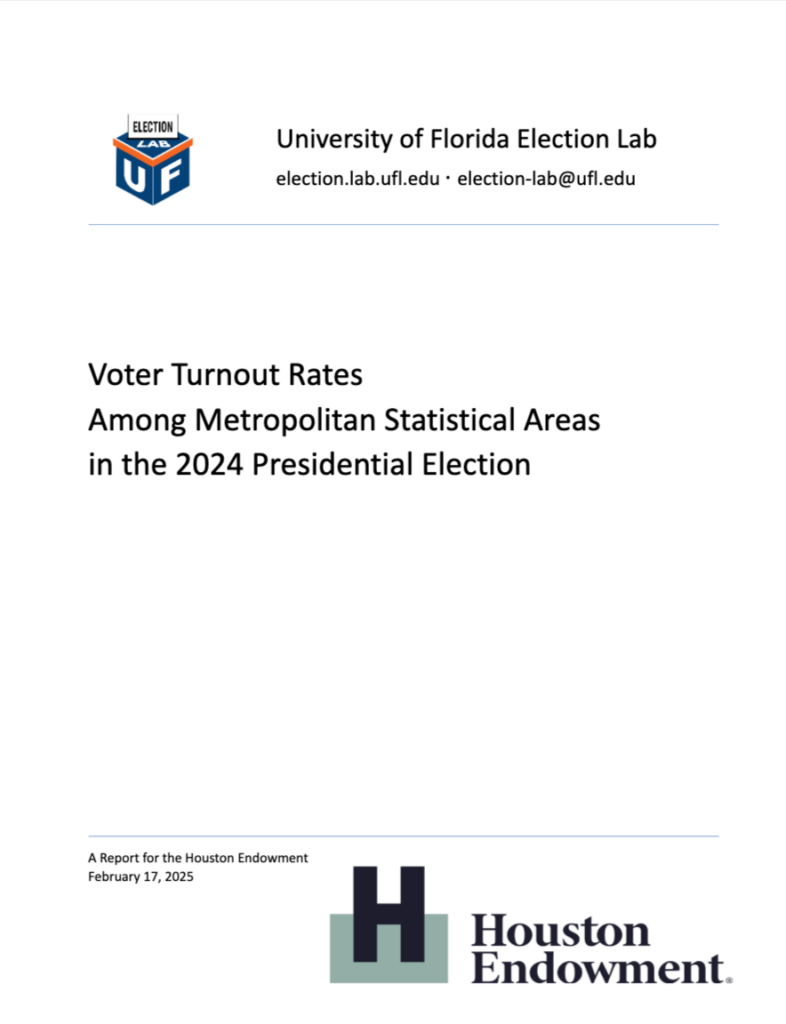
When it comes to voter turnout, an annual snapshot may not always reveal the whole picture. In Houston, for example, voter turnout rose about 10 percentage points from 2016 to 2020 before leveling off at 58% in 2024. A new report by the University of Florida Election Lab offers a more comprehensive view of voter turnout trends for a region that ranks among the lowest of major U.S. metropolitan areas.
Houston Endowment commissioned the research with one clear goal: to equip nonprofits on the ground with actionable insights.
At a recent convening hosted by Houston Endowment, national voting expert Dr. Michael McDonald joined civic leaders to examine these trends, highlighting opportunities for impact and the critical role that local organizations play in shaping long-term civic culture.
“The story here isn’t about disengagement,” Dr. McDonald said of the updated research on Metropolitan Statistical Areas in the 2024 presidential election. “It’s about structural and strategic factors. And where you do the work—especially in historically underrepresented communities—you see real potential for long-term change.”
While 2020 was an unusually high-turnout year across the nation largely due to the pandemic and expanded vote-by-mail options, Houston’s overall trajectory still shows a general upward trend in participation. Dr. McDonald emphasized that this trend reflects the power of habit: when people vote once, especially early in life, they’re significantly more likely to keep voting. These gains, even if gradual, point to the importance of continued investment in engagement efforts.
Dr. McDonald highlighted several statewide policy factors that shape turnout, including the absence of same-day registration and restrictions on vote-by-mail. States like Minnesota and Colorado, which allow same-day registration and broader mail voting access, consistently rank near the top in turnout. However, he emphasized that voter engagement doesn’t have to wait for legislative change.
During the convening, Foundation staff shared a synthesis of lessons learned from grantee efforts during the 2024 election cycle. Organizations involved in voter outreach found their efforts were most effective when consistent, localized, and multi-layered.
“We heard again and again that there is no substitute for face-to-face engagement,” said Robiel Abraha, Learning & Evaluation Officer at Houston Endowment. “Digital tools matter, but what really moves people to vote is personal connection.”
Nonprofit and grantee leaders found the most success when combining in-person contact with digital outreach. Trusted messengers such as faith leaders, veterans, and local business owners played a powerful role, and volunteers who reflected the communities they served often built the strongest connections.
Civic leaders also underscored the importance of early and sustained outreach. Organizations that launched voter engagement efforts too late in the cycle struggled with recruitment and capacity. Structural challenges such as transportation, language access, and legal uncertainty further complicated the work, and nonprofit leaders acknowledged the importance of addressing these barriers with future programming.
Despite these obstacles, many groups emerged from the 2024 election cycle with stronger strategies and clearer goals.
“Our partnerships with academic institutions and grassroots organizations are essential to creating lasting impact, and grantees have shared how this research validates what they see on the ground,” said Civic Engagement Program Officer Miguel Rivera. “This research equips our grantee partners with the data they need to refine their approach.”
The Election Lab report and the insights gathered from community partners are part of the Houston Endowment’s larger strategy to strengthen the civic infrastructure in the region.
“This isn’t just about one election,” Abraha said. “It’s about building relationships year-round, supporting trusted messengers, and creating a culture where voting feels like a meaningful and unifying act.”

The Houston Endowment commissioned the University of Florida’s Election Lab to assess voter turnout in the Houston metropolitan area for the 2024 presidential election, updating similar studies conducted for the 2016 and 2020 elections. The report ranks the 25 largest U.S. metropolitan statistical areas (MSAs) by voter turnout using the citizen voting-age population (CVAP) as the base. Turnout rates were calculated using the number of votes cast in each MSA divided by its citizen voting-age population (CVAP), using the U.S. Census Bureau’s American Community Survey estimates.